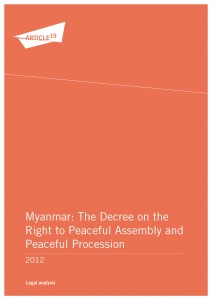Posts Tagged ‘Law Analysis’ (10 found)
Rule By Law: An Analysis of the Use of Legislation to Stifle Civil Society Space in Burma
This paper is primarily an analysis of the raft of legislation that is in the process of being pushed through parliament to target HRDs, activists, protestors and CSOs, and the threat that such legislation poses to their fundamental rights – which Burma is legally bound to respect and protect under the 2008 Constitution. This paper will also look at the current situation of political prisoners to demonstrate how the legislation is being misused in collaboration with a compliant judiciary and the Myanmar National Human Rights Commission […]
• • •Myanmar: Public Service Media Needed but Proposed Bill Inadequate
Establishing a genuine public service media is desperately needed in Myanmar to provide an independent, impartial and balanced source of information, and to encourage pluralism. Unfortunately, the proposed bill on public service media would if adopted continue state control of the media and the disenfranchisement of ethnic minorities. ARTICLE 19 urges parliament to make significant changes before adopting it […]
• • •Myanmar: Analysis of Government Press Law
The Centre for Law and Democracy (CLD) and International Media Support (IMS) today released Comments on the draft Printing and Publishing Enterprises Law (draft Law) released by the Ministry of Information of Myanmar in early March 2013. In August 2012, the Ministry tasked the Interim Press Council with preparing a draft Press Law, and the release of the draft Law by the Ministry came as a surprise to many observers. As the Comments make clear, the draft Law fails in important ways to conform to international standards regarding media freedom […]
• • •The Decree on the Right to Peaceful Assembly and Peaceful Procession
 The Decree on the Right to Peaceful Assembly and Peaceful Procession is one of the first laws governing civil and political rights to be adopted since the election of a quasi-civilian government in November 2010. ARTICLE 19’s analysis of the law finds the law to be inconsistent with the right to freedom of expression and the right to assembly.
The Decree on the Right to Peaceful Assembly and Peaceful Procession is one of the first laws governing civil and political rights to be adopted since the election of a quasi-civilian government in November 2010. ARTICLE 19’s analysis of the law finds the law to be inconsistent with the right to freedom of expression and the right to assembly.
In the analysis, ARTICLE 19 appreciates the Decree’s recognition of the state’s duty to protect assembly participants. However, the requirement for permission to hold an assembly, the grounds for denying permission, the lack of a court appeal and the absence of guarantees for media access to assemblies are problematic and must be urgently revised […]
List of the Most Problematic Provisions in the 2008 Constitution and Burmese Laws
This document gives an overview of provisions in the 2008 Constitution, Burmese laws and the Penal Code that are, in the view of the BLC, the most problematic for the development of rule of law and democracy in Burma […]
• • •Analysis of the Guarantees of Freedom of Expression in the 2008 Constitution of the Republic of the Union of Myanmar
When it was first introduced in 2008, the new Constitution of the Republic of the Union of Myanmar was deemed to be a great improvement over the previous constitution. An important part of this was the more robust guarantees it included for human rights. And an important part of the latter was its relatively strong guarantees for freedom of expression.
At the same time, the guarantees for freedom of expression in the 2008 Constitution do not fully meet international standards in this area. This Analysis outlines the key attributes of international standards, and indicate how the guarantees of freedom of expression in the 2008 Constitution fail to meet these standards […]
• • •Revealing Burma’s System of Impunity
This briefing paper analyzes the inability of the domestic judicial system to ensure accountability for atrocities committed in Burma. It concludes that the judicial system in Burma only serves to ensure impunity for crimes committed by those in power and therefore the international community has both the right and duty to act […]
• • •Analysis of the 2008 SPDC Constitution for Burma
Burma’s ruling junta, the SPDC, has decided to hold elections in 2010 to choose a civilian government under the 2008 constitution, which was adopted by force and fraud. Even if the elections are free and fair, the constitution will only allow for a partially civilian government rather than civilian rule.
International attention has focused most on the constitution’s mandate that the Tatmadaw will appoint 25% of the various legislative bodies. But there’s a much bigger problem: under the constitution, the Tatmadaw is not subject to civilian government, and it writes its own portfolio. It can do whatever it wants […]
• • •The 2008 Myanmar Constitution: Analysis and Assessment
International constitutional scholar, Yash Ghai, presents an analysis of the SPDC’s 2008 Constitution.
• • •Burma’s State Protection Law: An Analysis of the Broadest Law in the World
An analysis of the Burmese junta’s State Protection Law in the context of the global war on terrorism.
• • •








 All posts
All posts